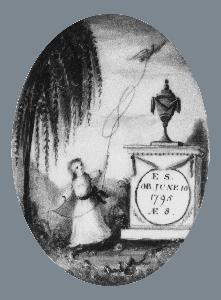Anstiss Stone
Anstiss Stone
yer: St. Albans
Doğmuş: 1778
Ölüm: 1807
Biyografi:
Anstiss Stone was an American businessman and philanthropist who was an Old China Trade merchant. He was born in St. Albans, Vermont, in 1801, and was educated at Cheshire Academy in Cheshire, Connecticut. He began his career as a merchant in 1815, working for Edward Carrington & Company in Providence, Rhode Island. In 1823, he was stranded in Valparaíso, Chile, where he took employment with the firm Richard Alsop of Middletown, Connecticut. He eventually formed a partnership with John Cryder of Philadelphia in 1825. In 1829, he retired from the firm. Due to impaired health, he traveled to Canton, China in 1833 and took over a partnership in Dunn & Company. He formed close ties with a junior partner Joseph Archer and established a new merchant house, Wetmore & Company, with Joseph Archer. Wetmore's profit and loss ledgers from 1834-1839 reveal that the primary goods brokered by Wetmore & Co. were tea, tea papers, silks and spices. Lesser cargoes were wines, ports, opium, hemp, pearl buttons, copper and coffee. They also transported a variety of foreign currencies, and delivered Sunday newspapers. 'Fast boats' were commonly employed for personal passages and letters. The company went on to be one of the largest mercantile houses in the East Indies despite the fact that Wetmore was opposed to the opium trade. During his time in the Far East, Wetmore collected a variety of Chinese objects, porcelains and china, which he imported home. It was in 1835 that the Maryland merchant George Peabody sailed to London on a mission to defer a United States banking crisis when states had begun skipping interest payments on bonds marketed in London. Peabody eventually enjoyed a huge success as a merchant banker in London and as a self-appointed American ambassador of the mercantile industry. He developed a form of wholesale banking known as merchant banks and became a leading dealer of American state bonds in London. It was through family and business connections that William S. Wetmore began a lifelong friendship with the prominent financier Peabody. In 1844, he revisited his partnership with Cryder and formed the house of Wetmore and Cryder in New York City. He retired from the firm in 1847. According to Barrett in The Old Merchants of New York City, besides his success in the merchant trade, Wetmore acquired vast land holdings of 10,000 acres in Ohio and 70,000 acres in Tennessee and his net worth at retirement was valued over one million dollars. Wetmore later left New York City and retired to Newport, Rhode Island, where he bought 15 acres of land.

